The Best Primers to Stop Tannin Bleed
One of the biggest challenges when painting furniture is tannin bleed through – where dark stains appear on the surface of your paint due to the wood’s natural color seeping through. The best way to avoid this problem is to use a quality primer, designed specifically to stop tannin bleed through.
In this blog post, we’ll take a look at some of the best primers to stop tannin bleed through when painting furniture. Also, learn more about the different types of paint for furniture here!
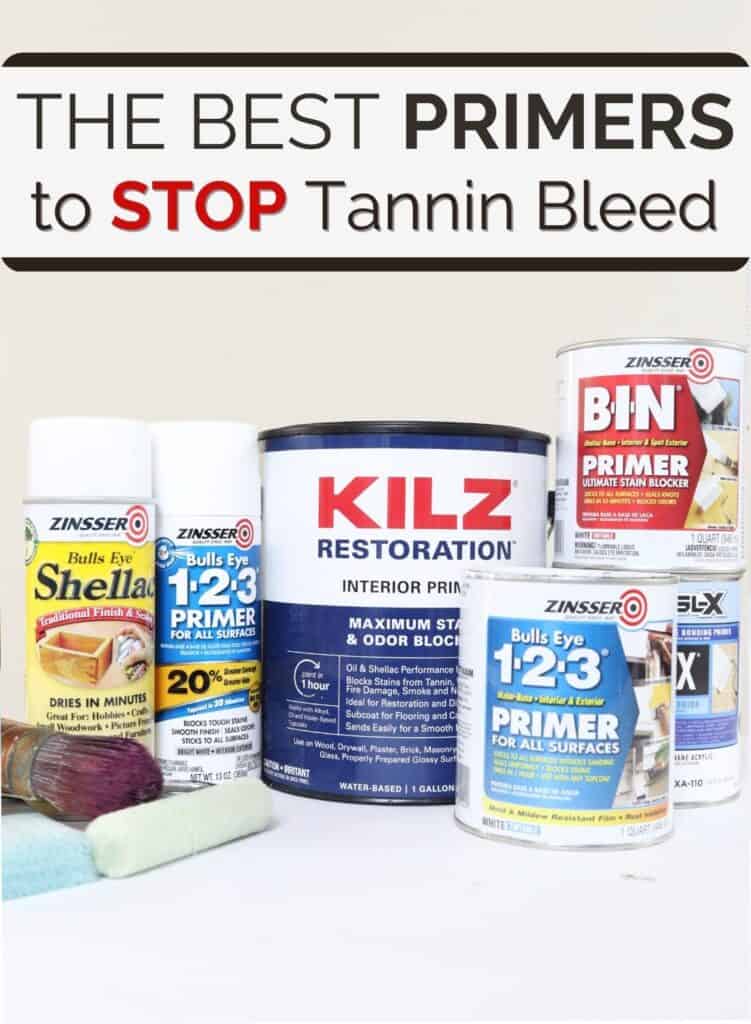
If you’ve been doing any painting projects lately with waterbased paints, chances are you’ve heard of tannin bleed through. But what is it exactly, and how can you stop it?
Tannin bleed through is a common issue when painting wood, especially if the wood is untreated or unfinished, and if you’re using waterbased products.
Bleed through occurs when certain tannins in the wood leach through the paint coating and cause discoloration or stains.
Fortunately, there are several primers available that can help prevent this from happening. And a lot of these are on our list of the best primers for painting furniture.
Let’s take a look at some of the best primers for stopping tannin bleed.
As an Amazon Associate, I earn from qualifying purchases. I also may earn from other qualifying purchases with other companies or get free product to review and use. All opinions are my own.
BIN Shellac Based Primer
BIN shellac-based primer is one of the most effective primers for preventing tannin bleed.
It comes in both water-based and shellac-based formulas, but the shellac-based formula is what you need to block tannin bleed.
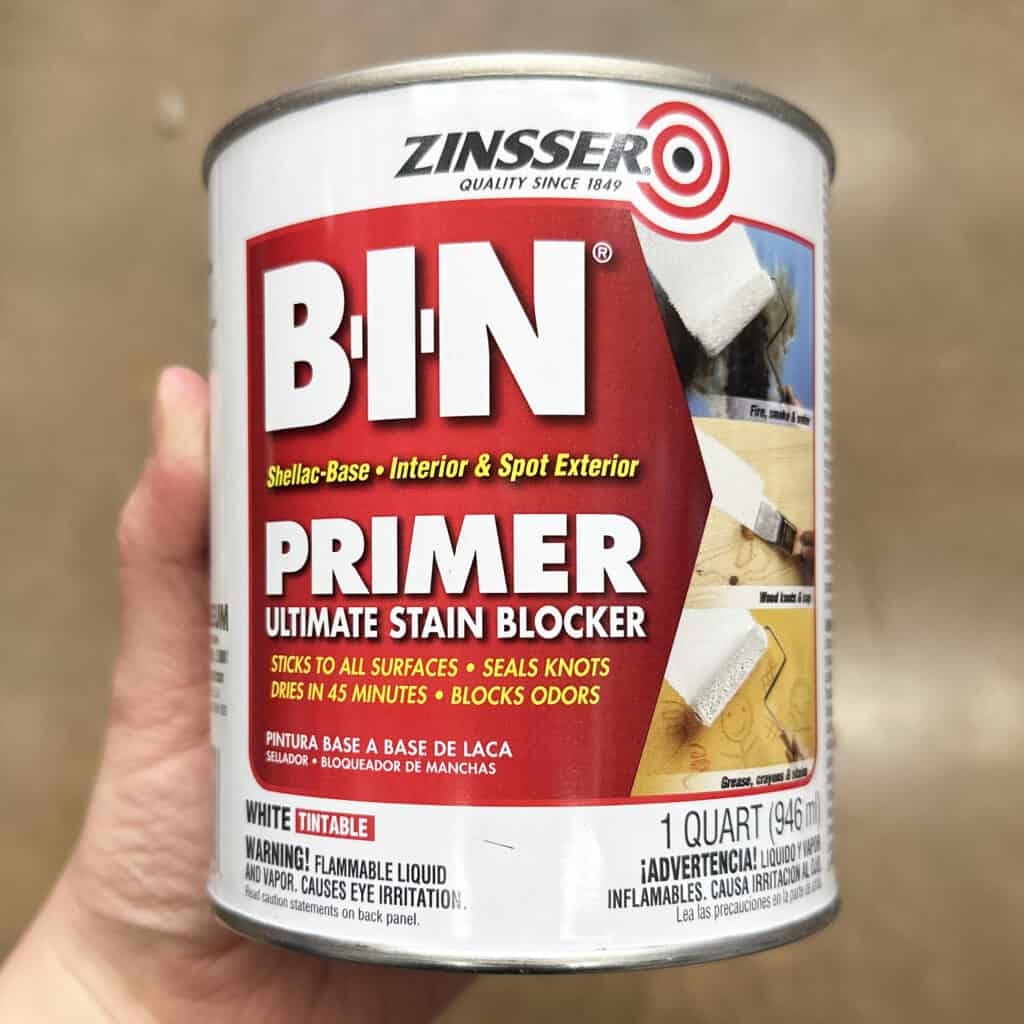
For maximum stain blocking ability, I like to apply 2 coats, and let it dry overnight before painting over it.
BIN primer also provides excellent adhesion for latex and oil based paints and has superior stain blocking power as well.
It works well on both interior and exterior surfaces such as wood, drywall, metal, and masonry. Its fast drying formula makes it ideal for any project that requires speed.
This primer also seals knots, sap streaks, and other common surface issues that plague DIY projects.
But since it’s shellac-based, it comes with fumes. So work in a well-ventilated area, and wear a respirator when using it.
It’s very thin, so it’s easiest to use a paint roller to roll it on, or use a spray can to spray it on. Have a cheap paint brush on hand to get into tight areas that a roller can’t get into.
Here are the best rollers for painting furniture… yes, the roller matters if you care about how your finish looks.
One thing I LOVE about it is that BIN shellac sands easily into a fine powder once it has dried for about 45 minutes. So if you do get runs or drips in your primer, they are easy to sand out.
Warning: Shellac has a very low flash point, meaning that it can combust at lower temperatures. So, if you’re thinking of spraying it with a paint sprayer, you might need to reconsider. Check your sprayer’s manufacturer warnings to see if you can use shellac products in your sprayer. Most beginner friendly HVLP paint sprayers do not recommend using shellac with the sprayers.
If you need to clean the BIN shellac based primer from the roller, paint brush, or anything else, use a solution of 1 part ammonia mixed with 3 parts water, immediately after you’re done painting.
Beware, ammonia has a very strong smell as well. Here’s a detailed guide on how to clean shellac primer out of a sprayer.
Furniture Makeovers Using BIN Shellac Based Primer
Where to Buy BIN Shellac Based Primer
- Home Depot – Order BIN shellac-based primer online and pickup or ship to home
- Amazon – Ship BIN shellac-based primer to home
- Walmart – Ship BIN shellac-based primer to home
- Ace Hardware – Order BIN shellac-based primer online and pickup or ship to home
Clear Shellac
Clear shellac is another great choice when it comes to priming surfaces for tannin bleed protection. It’s easy to use and dries quickly—you can even re-coat 1 hour after applying your first coat!
For maximum stain blocking ability, I like to apply 2 coats, and let it dry overnight before painting over it.
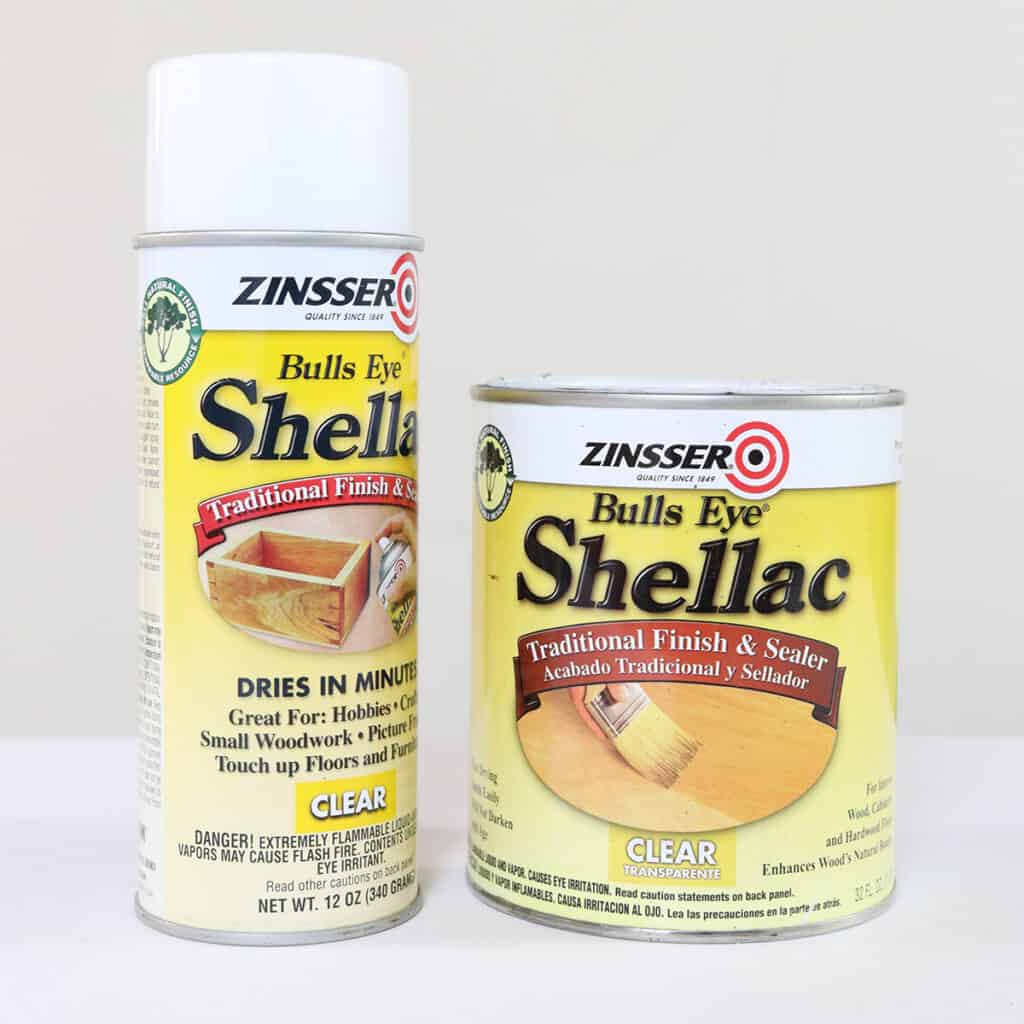
This fast-drying sealer not only stops the discoloration caused by tannins but also prevents other types of stains such as watermarks, smoke damage, and more from showing through the paint job.
Clear shellac can be used as a stand-alone sealer or as a base coat before applying paint or varnish.
If you’re worried about how well paint sticks to clear shellac, and if it can provide better adhesion, check out this post on how to paint laminate furniture with and without sanding.
Just like BIN shellac based primer, clear shellac has a strong odor and should be used in a well-ventilated area. Additionally, it’s flammable and must be kept away from open flames or sparks.
I personally prefer to spray shellac on with the spray can version. It’s the easiest and fastest way to apply it. But it’s also the stinkiest way. Be sure to wear a respirator and spray it outside.
You can also use the regular quart size brushable version. Apply it with a cheap paint brush or roll it on with a paint roller. It’s very thin though, and it dries super fast, so brushing without leaving brush marks is difficult.
To clean up the roller or brush afterward, use 3 parts water mixed with 1 part ammonia. Acetone or denatured alcohol works too.
Furniture Makeovers Using Clear Shellac
Where to Buy Clear Shellac
- Home Depot – Order clear shellac online and pickup or ship to home
- Amazon – Ship clear shellac to home
- Walmart – Ship clear shellac to home
- Ace Hardware – Order clear shellac online and pickup or ship to home
Cover Stain Oil Based Primer
The Cover Stain oil-based primer is another great option for stopping tannin bleed on wood surfaces.
It provides excellent adhesion for both latex and oil-based paints as well as blocks tannin stains–all without cracking or peeling over time!
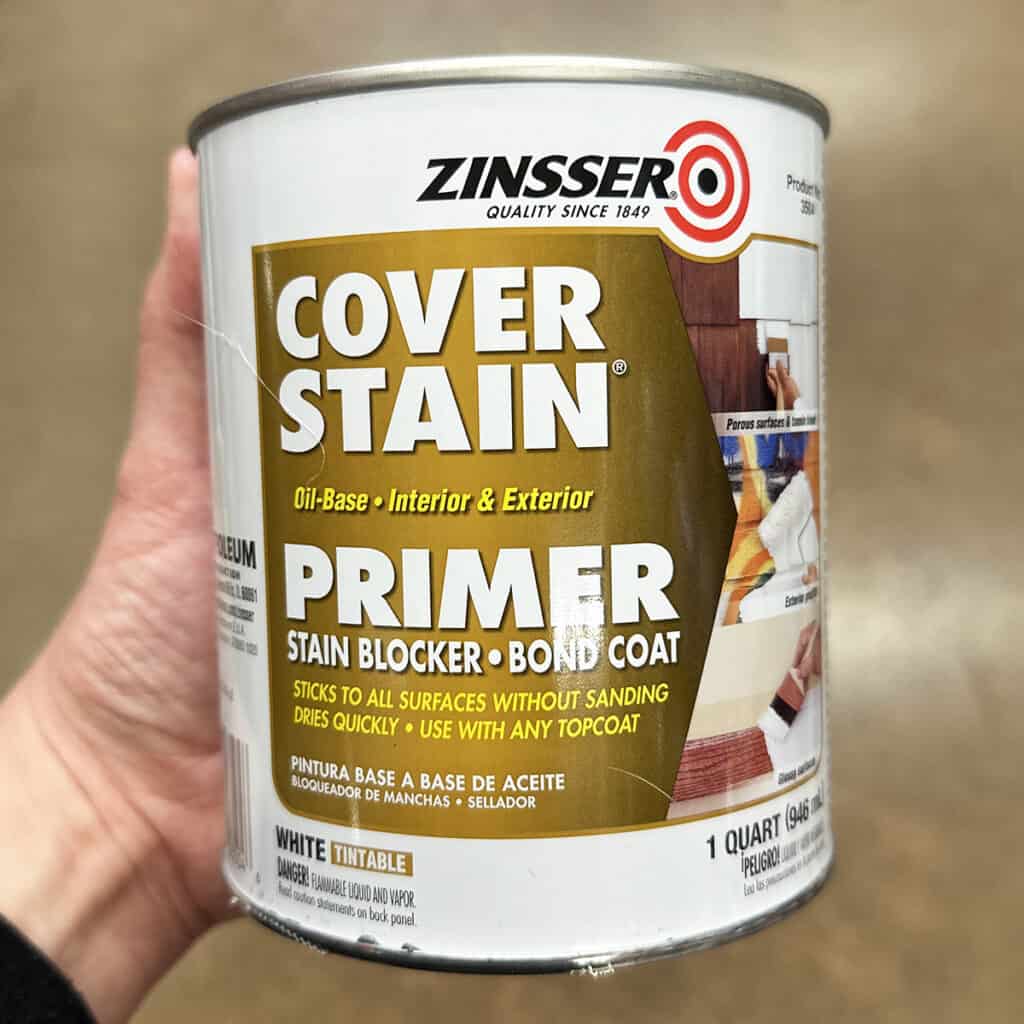
Plus, this primer helps seal out moisture which makes it perfect for outdoor projects where weather elements can be an issue.
Unfortunately, oil-based products take extra time to dry completely. You can paint over Cover Stain after only an hour.
But, just know that you can’t sand the primer back without gumming up your sandpaper with only a few swipes. So, it’s best to give the primer at least 24 hours to cure if you need to sand it at all.
Just like the others, Cover stain oil based primer has a strong smell, so wear a respirator and work in a well-ventilated area. Work outside if spraying!
Check out my in-depth Zinsser Cover Stain Primer Review here to learn more.
Cover Stain can be applied with a paint brush, a paint roller, spray can, or even a paint sprayer. And you can clean up your tools with mineral spirits or paint thinner.
Where to Buy Cover Stain Oil Based Primer
- Home Depot – Order Cover Stain oil based primer online and pickup or ship to home
- Amazon – Ship Cover Stain oil based primer to home
- Walmart – Ship Cover Stain oil based primer to home
- Ace Hardware – Order Cover Stain oil based primer online and Pickup or ship to home
Kilz Original Oil Based Primer
Kilz oil based primer is also a good oil based primer for blocking tannin bleed. It is very similar to Cover Stain oil based primer.
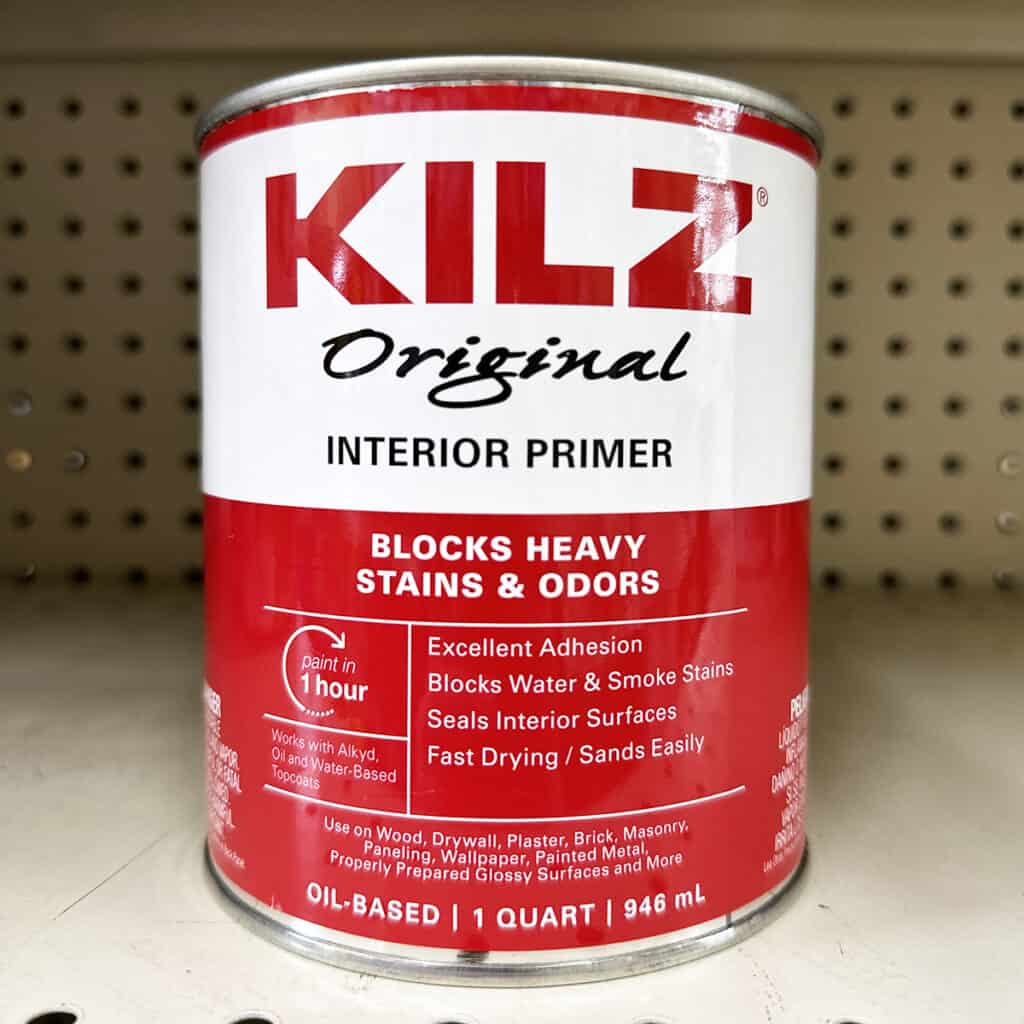
Where to Buy Kilz Original Oil Based Primer
- Home Depot – Order Kilz Original oil based primer online and pickup or ship to home
- Amazon – Ship Kilz Original oil based primer to home
- Walmart – Ship Kilz Original oil-based primer to home
- Ace Hardware – Order Kilz Original oil based primer online and pickup or ship to home
123 Water Based Primer
If you’re looking for a water based primer that will block tannin bleed, Zinsser 123 primer is a great option.
It will not block bleed through as easily as the shellac and oil based primers, but if you have time, it can block them just as well.
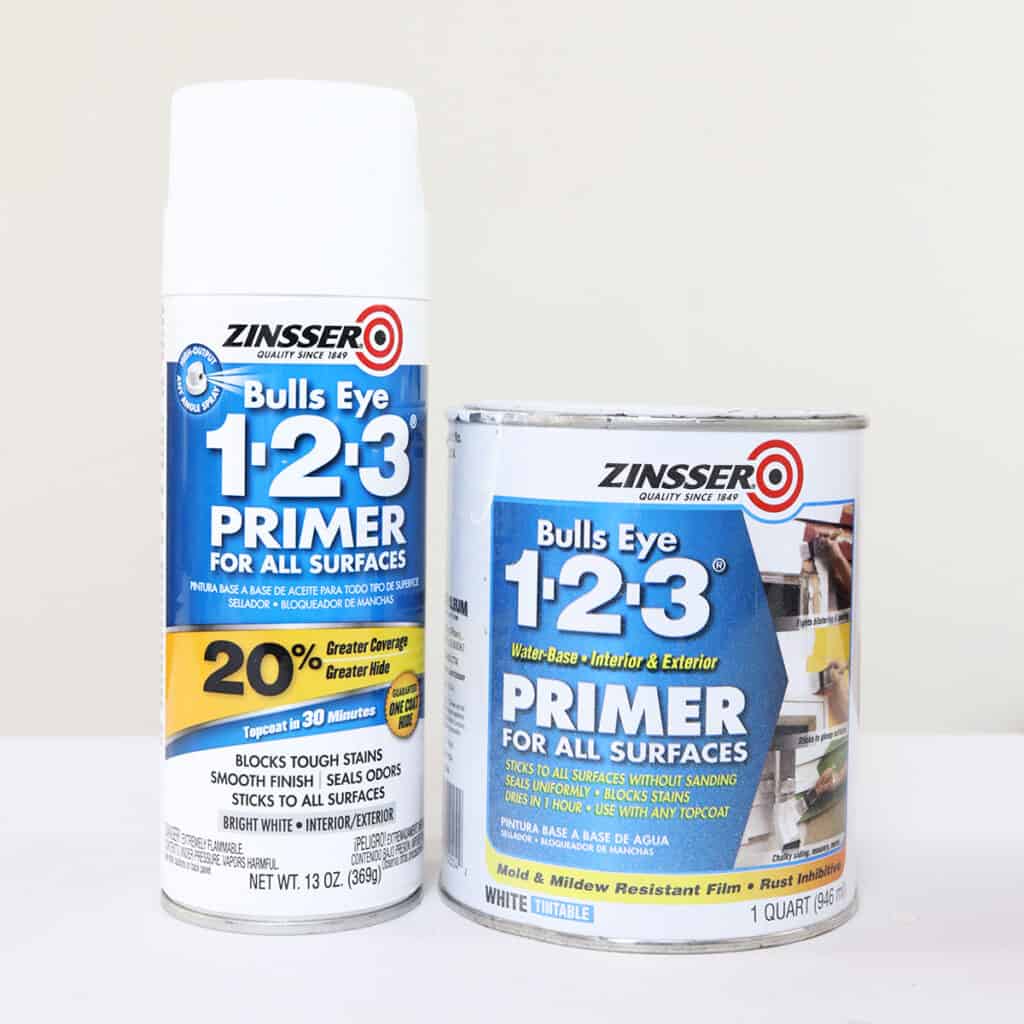
For best results, let the primer dry overnight between coats. If you let the primer dry for a few hours between coats, it can start to cure a little bit, which will help block the tannin bleed.
Also for best results, apply at least 2 coats of primer, letting it dry overnight between coats. If you still see bleed stains after the 2nd coat, apply another coat after the primer has dried overnight.
You don’t have to deal with harsh fumes, and cleanup is easy with soapy warm water.
123 primer is THICK. You can apply it with a paint brush or a paint roller. It is way too thick for a paint sprayer, and if you thin it out, it will not adhere well to your surface, even after you scuff sand…. ask me how I know.
(Check out this high gloss dresser makeover where I made that mistake.)
You can topcoat 123 primer with oil based or latex paint, an hour after the primer was applied and it can be used for interior and exterior projects.
It suggests that it can stick to any surface without sanding, but really, it doesn’t. So be sure to scuff sand your surface before using 123 primer. Here’s more about sanding before painting furniture.
Note: The spray can version is actually oil based. So, expect better stain blocking and adhering ability with the spray can version. It also has more fumes haha
Check out this post to learn more about what the best spray primer for wood is.
Where to Buy Zinsser 123 Primer
- Home Depot – Order Zinsser 123 primer online and pickup or ship to home
- Amazon – Ship Zinsser 123 primer to home
- Walmart – Ship Zinsser 123 primer to home
- Ace Hardware – Order Zinsser 123 primer online and pickup or ship to home
Kilz Restoration Water Based Primer
Another great waterbased primer option is Kilz Restoration primer. You can expect it to be similar to Zinsser 123 water based primer.
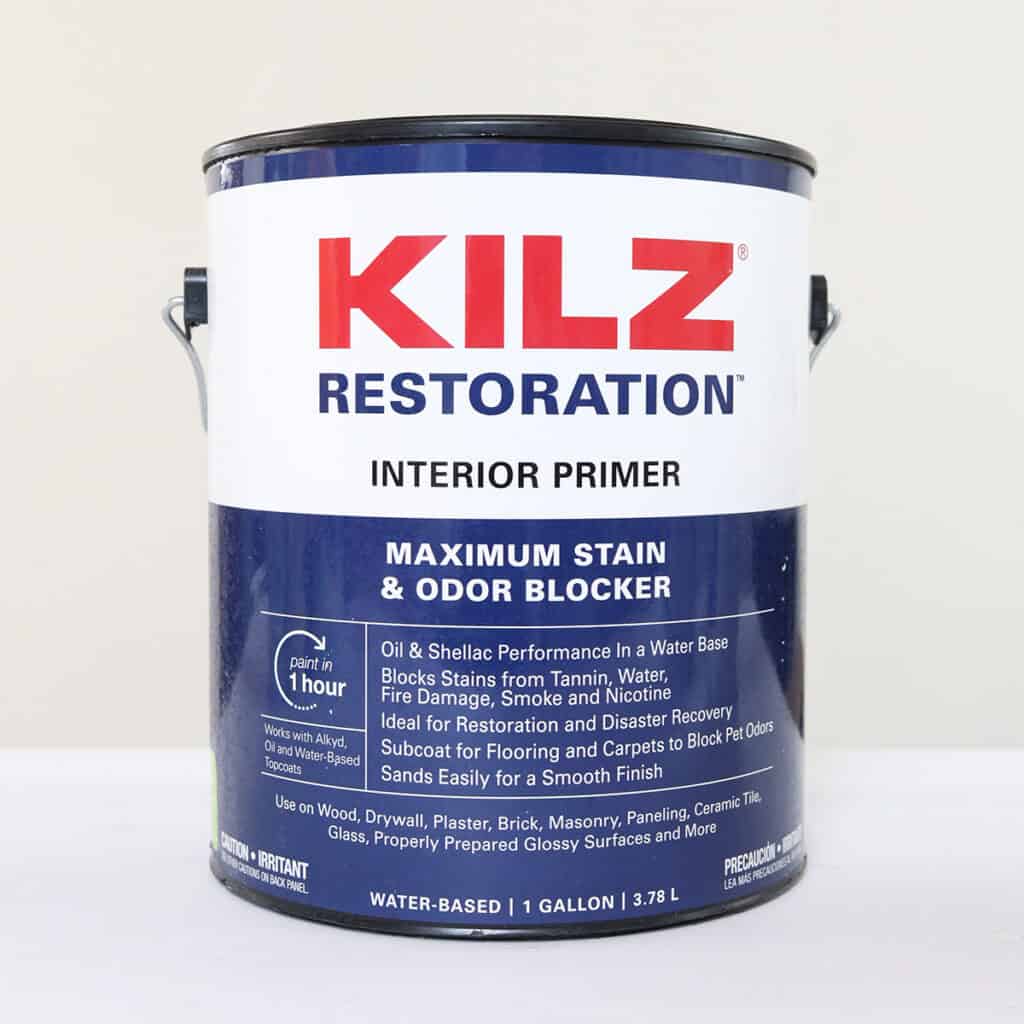
Where to Buy Kilz Restoration Primer
- Home Depot – Order Kilz Restoration primer online and pickup or ship to home
- Amazon – Ship Kilz Restoration primer to home
- Walmart – Ship Kilz Restoration primer to home
- Ace Hardware – Order Kilz Restoration primer online and pickup or ship to home
No matter what type of primer you choose, learn exactly how to stop stains from coming through paint here.
It’s important to take the time and effort to ensure your surface is properly prepped before applying. Here’s more about how to prepare furniture for painting.
Whether you need an oil-based or water-based primer, there are many great options available that can help stop tannin bleed on wood surfaces.
Check out my list of the best water based primers here.
We hope this post has given you a better understanding of each product so you can make an informed decision when selecting one for your next project!
If you want to learn more about the importance of priming wood for painting, head on over to this post.
With proper prep work and careful application, any of these primers will be sure to give you excellent results.
More Painting Furniture Resources
- Best Bonding Primer for Laminate Furniture
- Best Paint for Wood Furniture
- How to Stop Wood Knots from Bleeding Through Paint
- How to Get Rid of Smoke Smell in Furniture
- How to Paint Wood Furniture Without Sanding or Priming
Follow us on YouTube to get more tips for painting furniture.
Or share your project with us on our Facebook Group and be part of our community. See you there!

I wonder if you have ever tried General Finishes version of this. I think it’s called Stain Blocker.
I have! It worked very well to block stains. The only problem was that we had to stir the stuff for a long long time and even still there would be chucks of product at the bottom of the can. Maybe I just had a bad batch, but I bought a couple different cans of it. It still blocked stains well but I was always nervous about those clumps at the bottom that I couldn’t get stirred back in. This was over 3 years ago, maybe things have changed since then.